How do you take your morning coffee? Black? Two lumps of sugar? How about with a side of marine ecology?
Being surrounded by sea and ocean on all sides, Ireland’s marine ecosystems are absolutely worth protecting. Now, you can sponsor a square meter of the sea floor in Clew Bay, Co Mayo, every time you purchase a bag of Green Ocean Coffee.
There are a few things which make Clew Bay a special marine environment. First of all, it’s an ideal location for cultivating shellfish, like rope-grown mussels (which we featured in Irish Country Living in 2021) or oysters. The bottom of the bay, though, is perhaps the most important part. While it has little to do with industry, it has everything to do with the overall health of the marine ecosystem and – in turn – the viability of sustainable fisheries within the locality.
Seagrass
Seagrass covers the floor of Clew Bay and while pretty to look at, its importance can’t be understated. The United Nations recently named 1 March World Seagrass Day – they refer to seagrass as an “antidote to climate change”.
While an important role of a seagrass meadow (as they’re called) is as a habitat and nursery for fish and other sea creatures, it also turns out that these meadows are highly efficient carbon sinks. They can store up to 18% of the world’s oceanic carbon (even though seagrass meadows only cover around 0.1% of the ocean floor; data from unep.org).
“Seagrass also acts as the first line of defence along coasts by reducing wave energy, protecting people from the increasing risk of floods and storms,” the UN website states.
In the Clew Bay Oyster Co-Op, there is a dedicated team who work to restore and maintain the seagrass beds. However, they lack the funding to keep this good work going. This is where Green Ocean Coffee comes in.
Green Ocean Coffee
Green Ocean Coffee is the latest range from David and Marguerite Lawlor’s business, Watermark Coffee. It was launched in January, 2023, as part of a unique partnership with the Clew Bay Oyster Co-op. The range comes in three flavours: Inishgowla, Dornish and Inisheeny (all Clew Bay island names). The beans themselves are sourced directly from farmers and are roasted in Ireland.
Speaking with Irish Country Living Food, David says, as a nature lover, he has spent a huge amount of time exploring the seas (as a diver), both in Ireland and abroad. He has seen many negative changes in marine environments over the past 20 years and this is what inspired him to connect with the Clew Bay Oyster Co-Op.
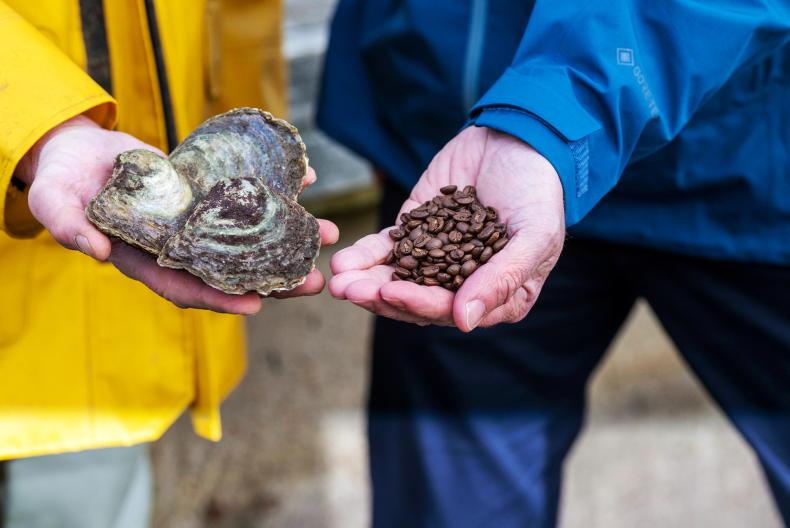
Coffee and oysters are not a usual food and drink pairing, but this so-called "odd marriage" between Clew Bay Oyster Co-Op and Green Ocean Coffee is working well / Andrew Downes
“In Ireland, the level of fish in the water needs to be addressed,” he says. “It’s not from over fishing; it’s from loss of habitat. We wanted to put a project together that tried to capture the wider audience who wanted to get involved in something that would make a difference in Ireland. This was a really complicated project to put together, so Bord Iascaigh Mhara [BIM] were really helpful and, eventually, we hooked up with Alex Blackwell and [rope mussel farmer and chair or Clew Bay Oyster co-op] Michael Mulloy.
“Alex and I talked about it and initially it seemed like a bizarre combo, but this partnership really works,” he continues. “Our customer base are mainly in the hospitality industry, at home or in offices, and people want to do something positive. This is a great way of doing it.”
Alex is a fisheries biologist and is the manager of the Clew Bay Oyster Co-op. The co-op originally existed to represent local oyster fishers, but over the years it has morphed into restoring and enhancing the biodiversity of the bay.
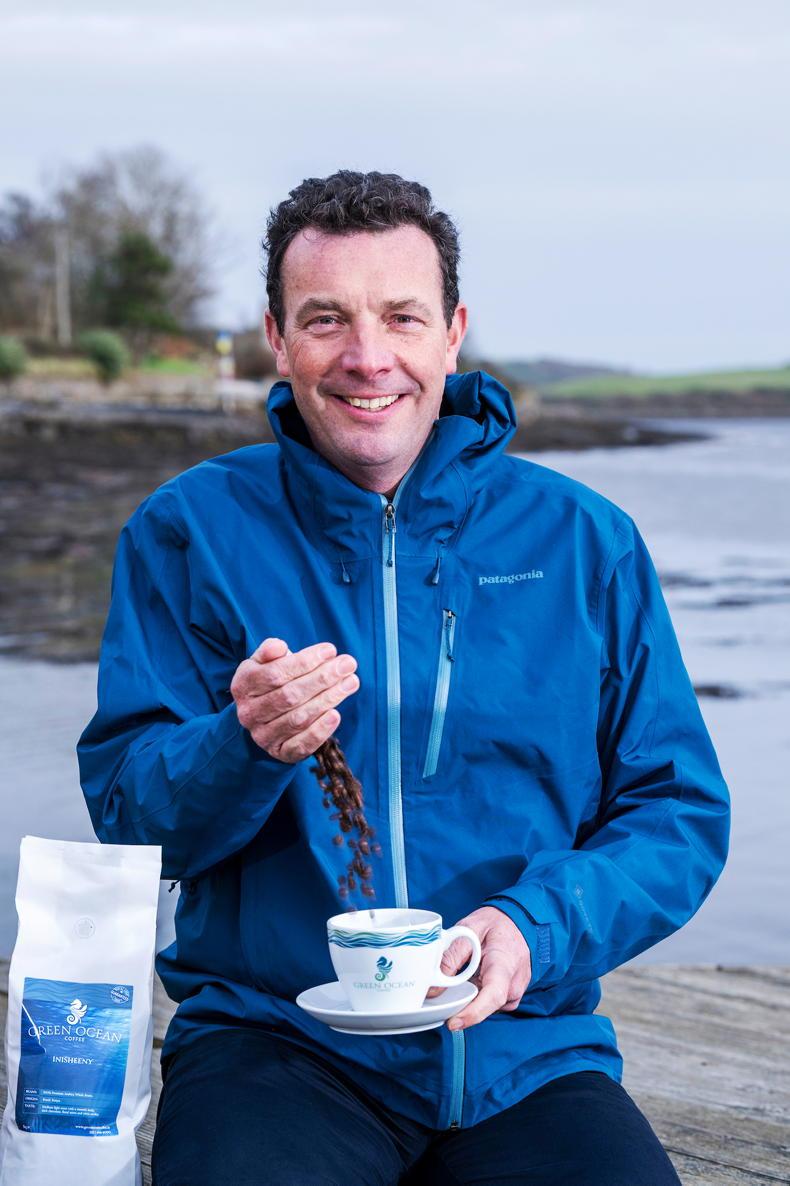
David Lawlor is managing director of Watermark Coffee, which he operates with his wife, Marguerite. He has an adventurous spirit and enjoys diving, in particular / Andrew Downes
“I had an oyster hatchery here in Clew Bay way back,” he tells Irish Country Living. “I’m semi-retired and have spent a lot of time working with the co-op getting these restoration programmes going again. Over the years, [finding David] was one of the best things that has happened to us.”
With the help of the Marine Institute, Inland Fisheries, the National Parks and Wildlife Service (NPWS) and local fishermen, the co-op were able to close off a vast area of the bay to all bottom fishing. The aim was to protect and restore the bay’s seagrass and merle (which is a red coralline algae) as both are very sensitive ecosystems.
“We keep two things in mind,” Alex says. “First, to protect the environment. Second, to create a brood stock area for the bay. When oysters reproduce, they produce larvae – putting a brood stock area in the bay and having the larvae dispersed will create spat everywhere in the bay. It’s beneficial, but this work is very labour intensive. We need to employ people to do this work, we need to survey the area in advance and we need to monitor it, but our finances are limited.
“With the likes of David and Marguerite coming in, it means that we could do this,” he adds. “These seagrass beds are very important habitats for pollock, cod, scallops and a myriad of invertebrates and little animals. You wouldn’t necessarily think about them twice, but they’re hugely important to the ecosystem – and that’s not even getting into the carbon sequestration and all of the environmental aspects involved with protecting this habitat.”
Exact coordinates
When you purchase a kilo bag of Green Ocean Coffee, your delivery includes a certificate telling you the exact coordinates of the square meter of the Clew Bay floor you have sponsored for restoration. If you plug the coordinates into google earth, you can fly straight to where your work is being done.
“Next on the list is to work with charter boat operators – we are looking at bringing people out to their sponsored spot on the bay,” says Alex.
Talk about “experiential” food and drink. But what about the coffee itself? The beans are sourced from Kenya and Brazil – the Inishgowla and Inisheeny are blends of Kenyan and Brazilian beans (Inishgowla also features beans from Honduras), while the Dornish is a single origin coffee coming from Mutwiri Coffee Estate in Kenya. If you like a bright, slightly acidic coffee, try the Inishgowla. The Inisheeny has sweetness, floral notes and deeper hints of dark chocolate, and the Dornish is more medium-bodied with lighter chocolate tones and citrus flavours.

Green Ocean Coffee can be purchased ground or whole bean / Terry McDonagh
Green Ocean Coffee aims to restore up to 180 hectares of Clew Bay. If you ask David why he started all of this, he will tell you it was for love – a love of coffee and of marine environments.
“This isn’t a marketing thing – it’s something I love. Being a diver gave me a unique insight into the challenges that we face. When it comes to climate action, authenticity trumps everything else.”
greenoceancoffee.ie
Read more
The perfect cuppa for your holiday brunch
Consumer: what does the plastic cup levy mean?
How do you take your morning coffee? Black? Two lumps of sugar? How about with a side of marine ecology?
Being surrounded by sea and ocean on all sides, Ireland’s marine ecosystems are absolutely worth protecting. Now, you can sponsor a square meter of the sea floor in Clew Bay, Co Mayo, every time you purchase a bag of Green Ocean Coffee.
There are a few things which make Clew Bay a special marine environment. First of all, it’s an ideal location for cultivating shellfish, like rope-grown mussels (which we featured in Irish Country Living in 2021) or oysters. The bottom of the bay, though, is perhaps the most important part. While it has little to do with industry, it has everything to do with the overall health of the marine ecosystem and – in turn – the viability of sustainable fisheries within the locality.
Seagrass
Seagrass covers the floor of Clew Bay and while pretty to look at, its importance can’t be understated. The United Nations recently named 1 March World Seagrass Day – they refer to seagrass as an “antidote to climate change”.
While an important role of a seagrass meadow (as they’re called) is as a habitat and nursery for fish and other sea creatures, it also turns out that these meadows are highly efficient carbon sinks. They can store up to 18% of the world’s oceanic carbon (even though seagrass meadows only cover around 0.1% of the ocean floor; data from unep.org).
“Seagrass also acts as the first line of defence along coasts by reducing wave energy, protecting people from the increasing risk of floods and storms,” the UN website states.
In the Clew Bay Oyster Co-Op, there is a dedicated team who work to restore and maintain the seagrass beds. However, they lack the funding to keep this good work going. This is where Green Ocean Coffee comes in.
Green Ocean Coffee
Green Ocean Coffee is the latest range from David and Marguerite Lawlor’s business, Watermark Coffee. It was launched in January, 2023, as part of a unique partnership with the Clew Bay Oyster Co-op. The range comes in three flavours: Inishgowla, Dornish and Inisheeny (all Clew Bay island names). The beans themselves are sourced directly from farmers and are roasted in Ireland.
Speaking with Irish Country Living Food, David says, as a nature lover, he has spent a huge amount of time exploring the seas (as a diver), both in Ireland and abroad. He has seen many negative changes in marine environments over the past 20 years and this is what inspired him to connect with the Clew Bay Oyster Co-Op.

Coffee and oysters are not a usual food and drink pairing, but this so-called "odd marriage" between Clew Bay Oyster Co-Op and Green Ocean Coffee is working well / Andrew Downes
“In Ireland, the level of fish in the water needs to be addressed,” he says. “It’s not from over fishing; it’s from loss of habitat. We wanted to put a project together that tried to capture the wider audience who wanted to get involved in something that would make a difference in Ireland. This was a really complicated project to put together, so Bord Iascaigh Mhara [BIM] were really helpful and, eventually, we hooked up with Alex Blackwell and [rope mussel farmer and chair or Clew Bay Oyster co-op] Michael Mulloy.
“Alex and I talked about it and initially it seemed like a bizarre combo, but this partnership really works,” he continues. “Our customer base are mainly in the hospitality industry, at home or in offices, and people want to do something positive. This is a great way of doing it.”
Alex is a fisheries biologist and is the manager of the Clew Bay Oyster Co-op. The co-op originally existed to represent local oyster fishers, but over the years it has morphed into restoring and enhancing the biodiversity of the bay.

David Lawlor is managing director of Watermark Coffee, which he operates with his wife, Marguerite. He has an adventurous spirit and enjoys diving, in particular / Andrew Downes
“I had an oyster hatchery here in Clew Bay way back,” he tells Irish Country Living. “I’m semi-retired and have spent a lot of time working with the co-op getting these restoration programmes going again. Over the years, [finding David] was one of the best things that has happened to us.”
With the help of the Marine Institute, Inland Fisheries, the National Parks and Wildlife Service (NPWS) and local fishermen, the co-op were able to close off a vast area of the bay to all bottom fishing. The aim was to protect and restore the bay’s seagrass and merle (which is a red coralline algae) as both are very sensitive ecosystems.
“We keep two things in mind,” Alex says. “First, to protect the environment. Second, to create a brood stock area for the bay. When oysters reproduce, they produce larvae – putting a brood stock area in the bay and having the larvae dispersed will create spat everywhere in the bay. It’s beneficial, but this work is very labour intensive. We need to employ people to do this work, we need to survey the area in advance and we need to monitor it, but our finances are limited.
“With the likes of David and Marguerite coming in, it means that we could do this,” he adds. “These seagrass beds are very important habitats for pollock, cod, scallops and a myriad of invertebrates and little animals. You wouldn’t necessarily think about them twice, but they’re hugely important to the ecosystem – and that’s not even getting into the carbon sequestration and all of the environmental aspects involved with protecting this habitat.”
Exact coordinates
When you purchase a kilo bag of Green Ocean Coffee, your delivery includes a certificate telling you the exact coordinates of the square meter of the Clew Bay floor you have sponsored for restoration. If you plug the coordinates into google earth, you can fly straight to where your work is being done.
“Next on the list is to work with charter boat operators – we are looking at bringing people out to their sponsored spot on the bay,” says Alex.
Talk about “experiential” food and drink. But what about the coffee itself? The beans are sourced from Kenya and Brazil – the Inishgowla and Inisheeny are blends of Kenyan and Brazilian beans (Inishgowla also features beans from Honduras), while the Dornish is a single origin coffee coming from Mutwiri Coffee Estate in Kenya. If you like a bright, slightly acidic coffee, try the Inishgowla. The Inisheeny has sweetness, floral notes and deeper hints of dark chocolate, and the Dornish is more medium-bodied with lighter chocolate tones and citrus flavours.

Green Ocean Coffee can be purchased ground or whole bean / Terry McDonagh
Green Ocean Coffee aims to restore up to 180 hectares of Clew Bay. If you ask David why he started all of this, he will tell you it was for love – a love of coffee and of marine environments.
“This isn’t a marketing thing – it’s something I love. Being a diver gave me a unique insight into the challenges that we face. When it comes to climate action, authenticity trumps everything else.”
greenoceancoffee.ie
Read more
The perfect cuppa for your holiday brunch
Consumer: what does the plastic cup levy mean?







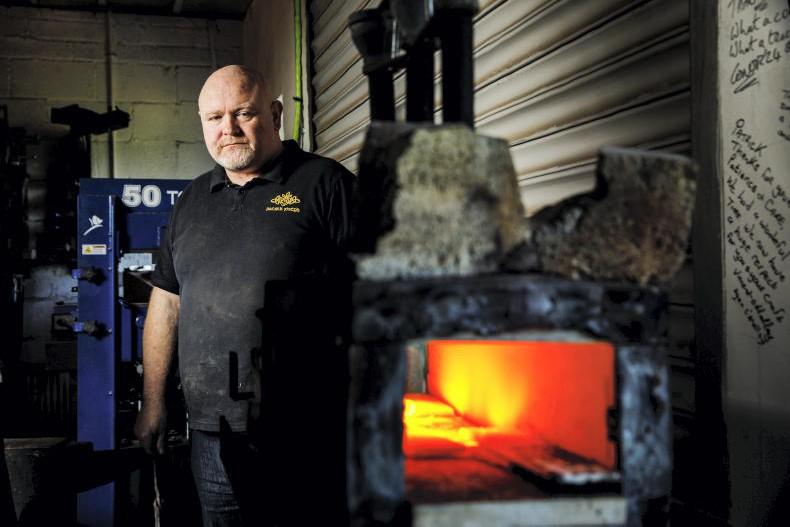

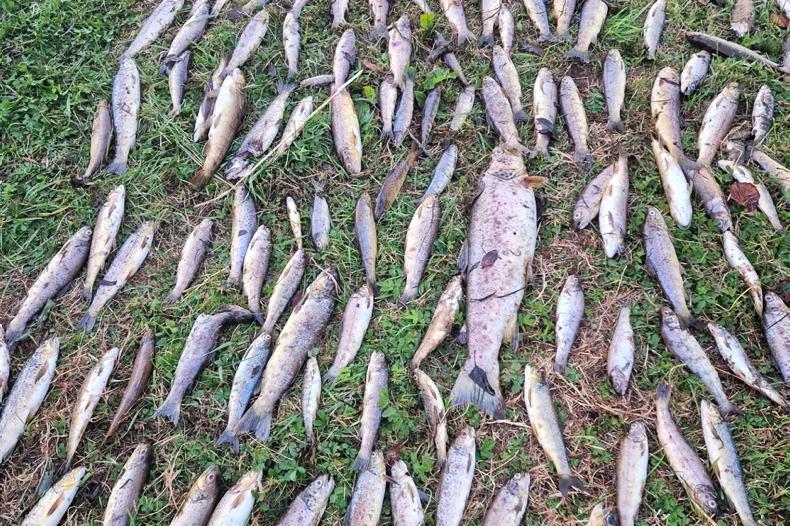
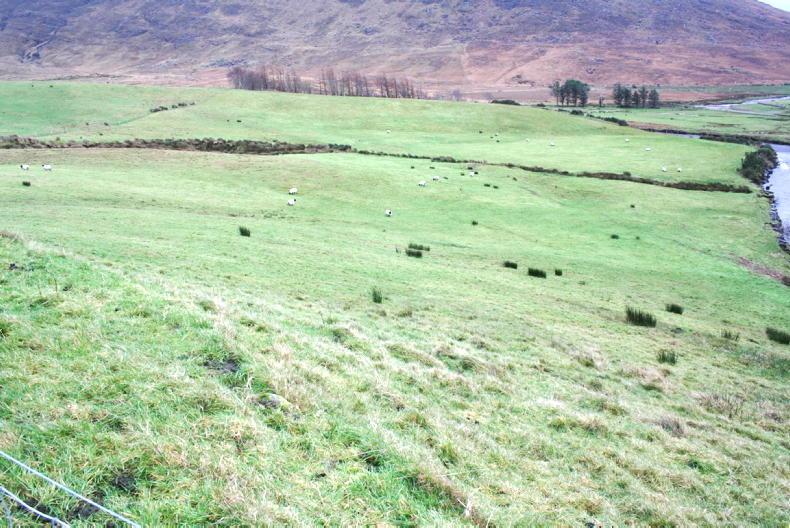
SHARING OPTIONS